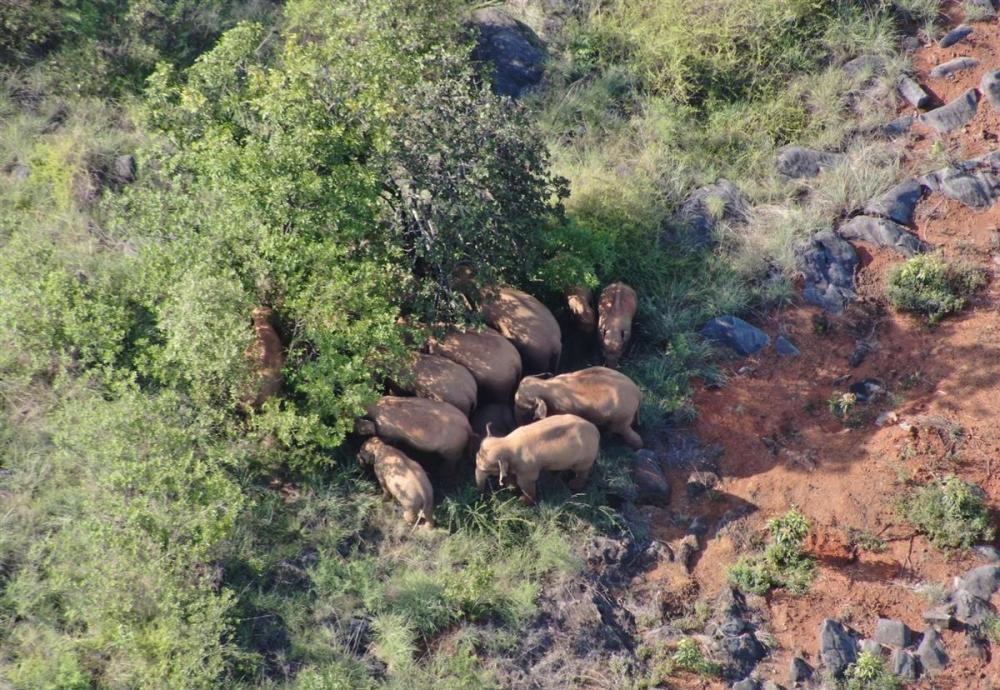The 15 elephants who fled from the Broken Nose family finally have a follow-up!
Earlier, an isolated juvenile male elephant from the Broken Nose family was anesthetized and sent to its original habitat; now the 14 elephants have crossed the Yuan River, just a step away from their hometown.

As for the reasons for the elephant's exodus, we still have no answer. But we know that elephants are not suitable for long-term survival in the north because they have higher temperature requirements, which are colder than the original habitat.
Climate changes, but also cause changes in plant populations, for example: Xishuangbanna and Kunming are also Yunnan, but the original forest of Xishuangbanna grows a large number of palm leaf reeds, wild plantains and other elephants love to eat plants, Kunming is less, can not meet the elephant's food needs, so as to switch to the use of corn, rice and other crops, and crops are rich in sugar, long-term intake will cause elephant disease.
In addition, the cold climate can also cause elephant disease, which is not conducive to the development of the population, and it is precisely because of this that wild elephants have never reached the Kunming area in recent decades.
However, now that the world is quietly warming, will elephants continue to migrate north in the context of global warming, and may even stay in the north for a long time?
<h1 class="pgc-h-arrow-right" data-track="7" > elephants and temperatures</h1>
In fact, elephants were once widely distributed in China, and even in the middle and lower reaches of the Yellow River, there are traces of elephant activities. Some scholars believe that Henan Province is referred to as "Yu" for short, and the elephant in Yuzhong is likely to indicate that elephants have been active here for a long time.
The main reason why elephants have been infested in Henan may be because in ancient times, China's temperature was generally high, and there was even a very rich subtropical plant group and animal population in Anyang during the Yin Dynasty, so it is not surprising that elephants are infested here.
But with the change of climate, elephants continued to migrate south, especially in the Western Zhou Dynasty, the tributaries of the Yangtze River even froze many times, such a cold weather is obviously not suitable for the survival of elephants.
During the Han Dynasty, the climate rose again and elephants began to move from south to north again. In other words, elephants have been migrating north and south for a long time, and the main reason for their north-south migration is climate change.
But later, with the continuous reduction of temperature and the increasing number of people, the population density in the middle and lower reaches of the Yangtze River and the middle and lower reaches of the Yellow River has been expanding, and the farming area has also been expanding, which has also led to the difficulty of elephants returning to the north, so they stay in China's Yunnan region, where the warm climate and small population density provide them with habitat.
Now that the world is warming and the temperature in the north is rising, will elephants go north again in the future and establish habitats in the north?
<h1 class="pgc-h-arrow-right" data-track="14" > global warming cause elephants to migrate north? </h1>
In nature, global warming causes some tropical plants to continue to grow northward, including elephants' favorite food. Changes in plant populations will also change animal populations, elephants will continue to migrate north from existing habitats, and it depends on how the climate changes.
However, due to human influence, elephants have difficulty spreading northward. On the one hand, this is because elephants prefer to live in forests, especially forests that are not so depressed. This is because elephants, although they are plant-eating animals, do not like to eat leaves, but live on herbs. If the forest is more closed, then the herbs under the forest are difficult to obtain sunlight, and naturally it is difficult to grow, which leads to less food available to elephants.
In addition, elephants like slopes that are not so high, and it is difficult for them to live if the slope exceeds 30 degrees, and they like to live below 10 degrees. In many parts of the north, the genter slopes have been converted into farmland, and the primary forests with higher slopes are not suitable for elephants.
On the other hand, elephants have a very high demand for energy, consuming more than 100 kilograms of food per day, and more importantly, these 100 kilograms of food are likely to come from 1,000 kilograms of plants, because elephants do not eat the whole plant, but only eat a part of each plant, such as: wild plantains only eat the core, and the rest is wasted.
Also, elephants who want to survive in the same area for a long time need to build a stable population to avoid inbreeding. This also makes elephants' need for habitat area also very large, and there are few places in the north that can meet their needs for habitat area.
Coupled with the dense population of the northern region, there are few suitable places for elephants to live, so even if the global warming, it is difficult for elephants to spread northward.
But this does not mean that they are confined to protected areas, in fact, local people have been building ecological corridors for them, connecting different habitats and expanding their areas of activity, while avoiding more interference with humans.
In addition, experts have been working hard to protect them, transforming local forests and planting plants that elephants like to eat, so that elephants can survive better and reproduce more offspring.